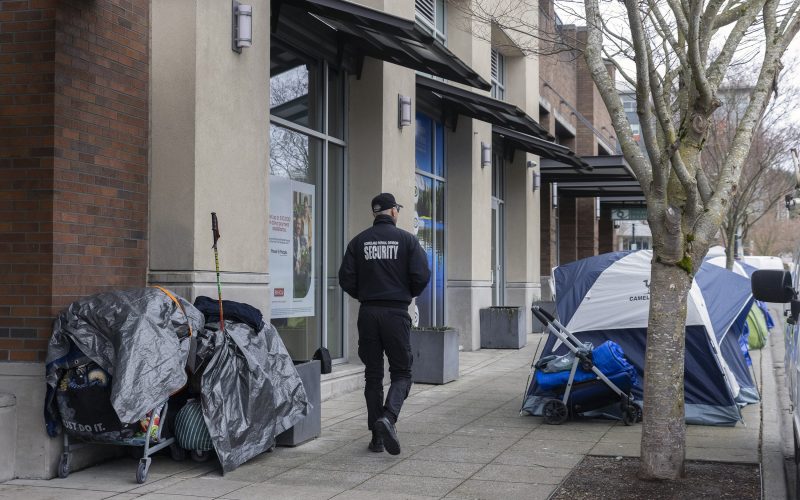SEATTLE One senator believes a new state guideline might help protect towns and homeless people amid an increasing wave of camping regulations.
Cities in Washington have swiftly increased the amount of land that is off-limits for camping, limited the hours that people can set up tents, and stiffened the penalties for violating these regulations after the U.S. Supreme Court overturned a rule last year that limited the amount of land that a city or county could ban people from living in parks and on sidewalks.
Burien, a suburb of King County, most recently made it unlawful for anyone to sleep outside, therefore making homelessness in the city illegal.
Officials are not providing programs or alternatives for individuals to go indoors with as much urgency, according to Rep. Mia Gregerson, D-SeaTac. As long as they adhere to a statewide standard, her plan would keep allowing localities to create their own regulations governing camping and sleeping. However, local officials have criticized the bill, claiming it is too ambiguous.
According to House Bill 1380, any regulations governing the use of public space must be objectively reasonable in terms of the time, location, and mode of operation. Although the city may be required to pay legal fees, it also shields cities from having to compensate individuals who claim they have been harmed by irrational regulations.
According to Gregerson, this law highlights the financial and human costs to society and local governments of having to rely on the outdoors for survival.
Two federal Ninth Circuit Court of Appeals decisions for around five years made it illegal for West Coast towns to arrest people for living outside in the absence of viable alternatives, such as cheap housing or a sufficient number of shelter beds.
Many local officials no longer felt compelled to provide shelter before removing someone from an encampment or using the fear of imprisonment to enforce camping laws after the Supreme Court overturned one of those decisions, Johnson v. Grants Pass, in June.
A number of Washington cities swiftly established or expanded camping bans, including Auburn, Bremerton, Chelan County, Lakewood, Washougal, Wenatchee, and Spokane Valley.
Many of those officials are now opposing the bill, arguing that the wording is too ambiguous and that it will result in legal disputes on the objective reasonableness of particular bans.
According to Melissa Chin, the city of Bellevue’s assistant city attorney, the ambiguity of the term “objectively reasonable” could result in uneven implementation.
According to Chin, even if the bill’s intentions are admirable, the city cannot accept it as worded.
Chin cautioned that funds could be diverted from supporting community programs to lawsuit defense. A Kent deputy city attorney and a representative of the Washington State Association of Counties expressed the same worry.
Twelve mayors, including Nancy Backus of Auburn, wrote Gregerson to express their disapproval of the bill. She believes the city has done a good job of creating initiatives that help individuals and hold the government and homeless people responsible.
Backus, a member of the board of the King County Regional Homelessness Authority, stated, “We would rather spend that money helping individuals than having to fight lawsuits.”
According to a state staffer at the House Committee on Appropriations hearing on February 12, the law does not define or provide examples of what is objectively reasonable, leaving judges to make that determination in court should legal issues emerge. The bill instructs judges to give the impact of the legislation on homeless persons extra weight.
Gregerson stated at the hearing that experts had advised her to utilize the well-established norm of objective reasonableness, which is applied in other legal domains.
The objectively reasonable criterion was initially developed to assess the appropriateness of a police officer’s use of force. It has been used in different situations to determine the justification of a course of action on an individual basis.
Attorney Fadi Assaf of King County’s Northwest Justice Project disputed the assertion that the law will result in a rise in cases. He reiterated that there is no way to award monetary damages.
Assaf claims that lawsuits are already being filed by advocates. For instance, Burien’s is already facing opposition.
According to him, if anything, objectively acceptable standards would result in fewer lawsuits for damages when cities sweep encampments because the guidelines and constraints will be obvious.
House plan 3115 of Oregon, which was passed during the 2021 legislative session, serves as the model for Gregerson’s plan. Local camping prohibitions have been successfully challenged using the legislation; in one instance, the Portland City Council chose to settle a lawsuit by paying the Oregon legislation Center $175,000 in legal fees.
According to a recent complaint against the Oregon city of Grants Pass, the ordinance prohibiting sleeping or storing personal property is objectively irrational. According to the allegation, an authorized spot to stay the night is too small and does not offer a suitable sleeping or drying space.
According to many who testified in support of the bill, it gives homeless people safeguards while enabling local governments to control public areas. According to Sharyl Brown of Jewels Helping Hands, a Spokane outreach program, she spent ten years caught in a cycle of addiction, homelessness, and incarceration.
According to her, many homeless people rely on public places for their safety, but they are continuously punished for just being there when they have nowhere else to go.
Brown also advocated for increased funding for services and support.
Eric Tars, a senior policy director at the National Homeless Law Center, is among the homeless advocates who oppose the law.
According to Tars, the bill is essentially about shielding governments from liabilities, despite its seeming desire to assist those who are homeless.
The measure contains an emergency declaration, which means that if it is approved, the law will go into force right away.
___
Visitseattletimes.com, 2025 The Seattle Times. Tribune Content Agency, LLC is the distributor.









